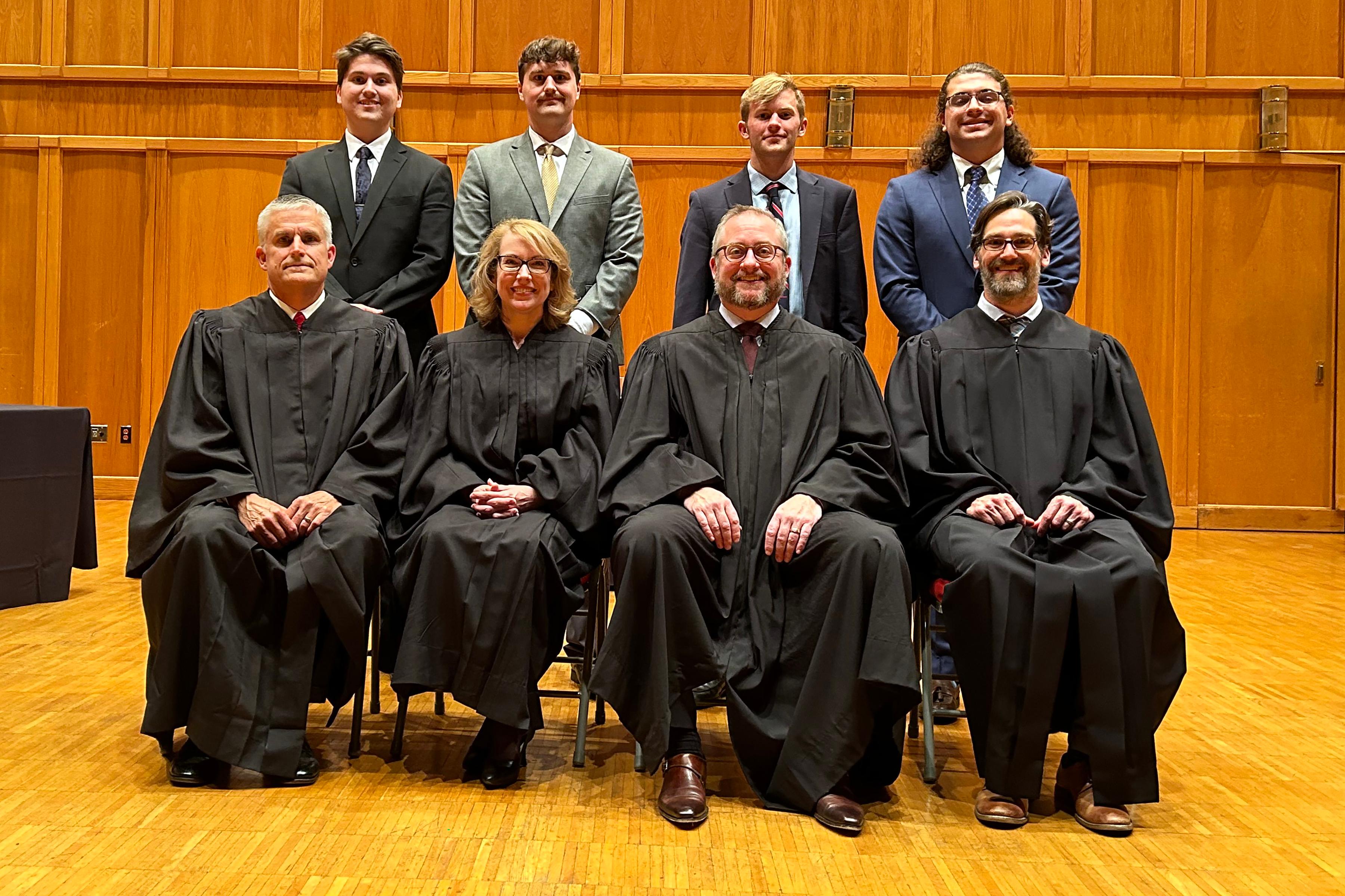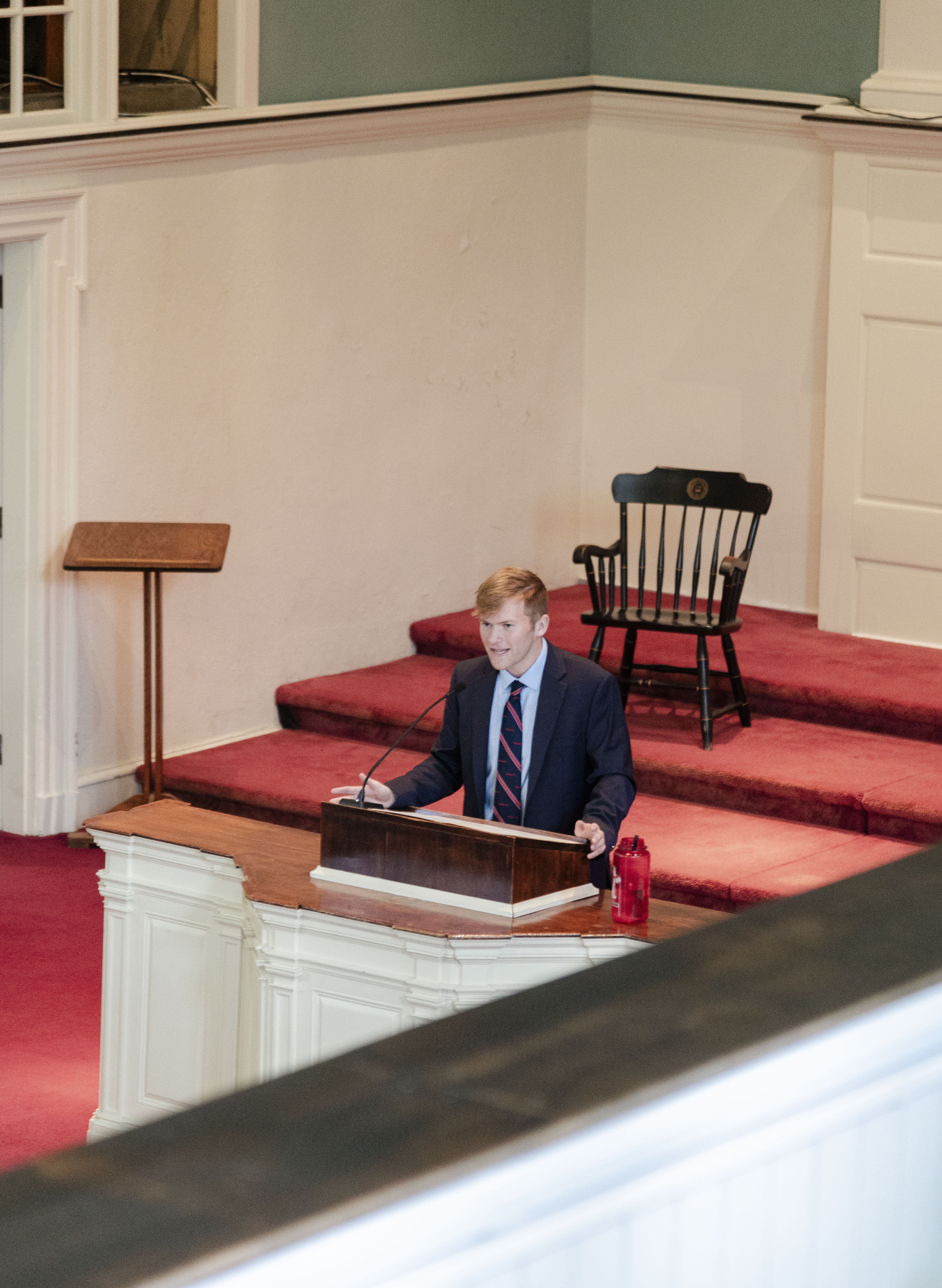It takes a special kind of person to be a good public defender.
These court-appointed attorneys must have strong analytical and communication skills. They must efficiently handle ever-changing, high-pressure situations. And they must act as empathic advocates for their clients.
Wabash’s Pre-Law Advisor Scott Himsel says Liam Grennon ’24 has what it takes.
“A lawyer has a duty to zealously represent his client, and that perfectly describes Liam,” said Himsel, associate professor of political science. “He is zealous. He is unrelenting. He won’t let go or give up on what he believes is right.”
Himsel has observed the senior’s grit in his constitutional law class, where he says Grennon is never afraid to engage and lead discussions regarding “hot button” issues and policies, even when his views differ from the majority.
“He presents his political opinions and beliefs in a way that his peers respect what he has to say,” Himsel said of the College Democrats member. “He is always prepared. He always participates. The quality of his work is always high.”
Grennon got to put some of the skills he’s learned at Wabash—from his political science classes, participation in Moot Court, involvement in Student Senate, Delta Tau Delta, ’shOUT, and the Writing Center, and leadership on the tennis team—to the test this past summer as an investigative intern within the Nashua office of the New Hampshire Public Defenders, thanks to support from the Coons Fund.
“I’ve always respected the work of public defenders as they are a crucial piece of our criminal justice system,” said the English major and history minor. “All too often, Americans who can’t afford representation face an uphill battle, and I wanted to contribute to ensuring everyone, regardless of financial status, can access justice within our legal system.”
Grennon, the son of a lawyer and law professor, remembers the first time he was ever exposed to the life of a public defender.
With his mom by his side, the then-young boy from Concord, New Hampshire, watched “Gideon’s Army.” The film follows three young public defenders in the South as they struggle against long hours, low pay, and staggering caseloads to ensure justice is served for underprivileged and socially marginalized people in their communities.
“Recognizing injustices in our society sparked something in me at a young age to want to do this kind of work,” he said.
His internship responsibilities included interviewing clients and witnesses, reviewing and finding evidence in ongoing cases, serving subpoenas, doing research for attorneys, and reviewing discovery with incarcerated clients. Most days he worked in the office or court, but he also had the opportunity to travel around the state to visit or interview clients and witnesses.
Grennon’s favorite part of the job was the unpredictively of what the day would bring working alongside attorneys, investigators, social workers, and legal assistants. He said every day brought new challenges and chances to learn more about what it takes to work as a public defender.
“I never wholly knew what to expect walking into the office at the start of the day. I might anticipate reviewing jail calls all day but then actually end up being in court watching a trial, or actually going to a jail or prison to talk to a client,” he said. “I’d be hard pressed to find an internship that could have taught me so much about such a vast area of the law.”

Himsel said most students interested in careers in law often don’t get to participate in these kinds of programs at the undergraduate level.
“It is very hard to get a job before you have finished your first year of law school,” he explained. “But Liam has had many opportunities as a student here, whether it’s participating in Moot Court or in the classroom where he’s done research, writing, and advocacy.”
Grennon said he was one of only nine undergraduates to participate in the internship program, compared to the roughly 30 legal interns who are currently attending law school.
“One of the legal interns goes to Harvard University, one goes to Georgetown University, another’s at Boston University—I was surrounded by and learned from a bunch of really talented, smart people,” Grennon said. “The opportunity to participate in such a selective program was huge.”
Grennon said he drew on many experiences and lessons he has learned over the past three years at Wabash to help him succeed in the internship.
His constitutional law class helped him understand technical legal definitions and processes and how to critically analyze and summarize large bodies of text under deadline. His English classes and work with the Writing Center taught him how to effectively communicate, orally and in writing. His leadership as captain of the tennis team, treasurer of the student body, and as a member of Delta Tau Delta’s national undergraduate council, has shown him how to respectively work with diverse groups of people.
“Coming into Wabash, I was pretty set in my beliefs. If I thought what you were saying is wrong, I wasn’t afraid to let you know, and I wasn’t giving a whole lot of space for you to be wrong,” Grennon said. “I quickly learned that’s not the way the real world works. You have to develop empathy, have an open mind, and be willing to listen to others who might not have the same opinions or experiences as you. That’s how you learn and grow as a person.
“I’m definitely not the same person I was when I first came to Wabash,” he continued, “but I’m confident the person I am now is much more genuine and equipped to do this kind of work.”
There were many lessons he learned during the 10-week internship, but Grennon said the biggest one was the reality that “life, unlike the law, is rarely black and white.”
“People, often face impossible choices under complicated circumstances. The law does what it can to make sense of all relevant information and still hold people accountable to the rules and standards of our society, but they can fall through the cracks,” Grennon explained. “I have yet to meet a client or work on a case where it was as simple as ‘this is a bad person who did a bad thing, so they deserve to go to jail’ or vice versa. It’s messier than that.
 “People who allegedly do horrible things still have redeeming qualities. Conversely, people who don’t do what they are accused of doing can be wrongly imprisoned,” he said. “At times all of this can be a hard to make sense of, but I learned how to approach these situations with compassion and passion.”
“People who allegedly do horrible things still have redeeming qualities. Conversely, people who don’t do what they are accused of doing can be wrongly imprisoned,” he said. “At times all of this can be a hard to make sense of, but I learned how to approach these situations with compassion and passion.”
Grennon recently completed the LSAT (Law School Admission Test) and is applying to law schools. He’s interested in potentially pursuing public defense, appellate law, or advocacy work with civil rights organizations.
No matter where he ends up, Himsel said Grennon will always be “an advocate for the underdog.”
“It’s not everybody’s nature, but it is his nature,” Himsel said. “You can’t have an adversarial system of justice without people who play that role well. That’s Liam.”